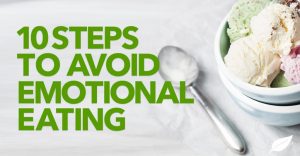Are You an Emotional Eater? 10 Tips to Break the Habit
 Obviously, eating food is important. However, if you use food as a way of coping with difficult emotions, you're probably an emotional eater. And that's not healthy! Being an emotional eater means repeated cases of overeating, and if you're trying to lose or maintain weight, it can be a powerful obstacle to your body goals. Use these ten tips to break the habit.
Obviously, eating food is important. However, if you use food as a way of coping with difficult emotions, you're probably an emotional eater. And that's not healthy! Being an emotional eater means repeated cases of overeating, and if you're trying to lose or maintain weight, it can be a powerful obstacle to your body goals. Use these ten tips to break the habit.
- Identify Triggers. Emotional eating is largely a result of some kind of mental unrest. Try to figure out what is causing you to eat. Is it actual physical hunger, or is it boredom? Are you trying to push down some uncomfortable feelings or thoughts? Finding out what causes the problem is the first step to solving it.
- Fight Boredom. Boredom is one reason some people become emotional eaters. If this is what's going on in your case, it's a pretty simple fix! Just find an activity that isn't food related. Read a book, watch a movie, or maybe invite some friends over for a get-together.
- Deal With Stress. The main reason for emotional eating is stress. Figuring out what kind of stress you're experiencing is a must if you want to break your bad habit. If you're anxious about something, expend that nervous energy by exercising. Take a walk or a run, or even a swim to remove some of those worries.
- Remove Temptation. If you've figured out the root of the issue, but you still need some extra help, don't worry! There's additional steps you can take to avoid overeating. Removing comfort foods that you know will tempt you keeps you from being seduced by chocolate ice cream or that delicious looking batch of donuts.
- Eat Slowly. One of the simplest steps you can take is slowing down during meal time. Really taste what you're eating and put down the fork in between bites. Sit back and enjoy the experience!
- Don't Deprive Yourself. In this context, not depriving yourself means avoiding the extreme cutback of calorie intake. Some weight-loss diets may cause you to feel super hungry, which only makes the problem of emotional eating worse. Starving yourself can start a cycle of overeating and feelings of shame, which is definitely not what you want.
- Healthy Snacks. Emotional eating can be related to your snack habits as well. When we eat a snack, we feel like we're not eating as much, which can lead to problems as you try to maintain or reduce your body weight. Pick low-fat, low-calorie snacks like fresh fruit or vegetables.
- Food Diary. Keeping a food diary can help you realize your emotional patterns. This provides valuable insight on what you like to eat and why. If you're trying to regain control of your eating habits, this tool can be a powerful way of getting you the knowledge you need.
- Value Yourself. If a food diary isn't enough, why not write a regular one too? Writing down things you deeply care about or that you're proud of can help remind you of your own value. This should rebuild the self-confidence you need to battle emotional eating.
- Learn From Setbacks. Breaking a bad habit isn't easy! You won't be able to do it on your first try, and maybe not on your second or third try either. But the important thing is to learn from your mistakes, forgive yourself, and try again. Find out what positive changes you can make to be victorious.
As you read through this list, did you realize that you're an emotional eater? If so, try out some of these ten tips to break the habit.
Share:
